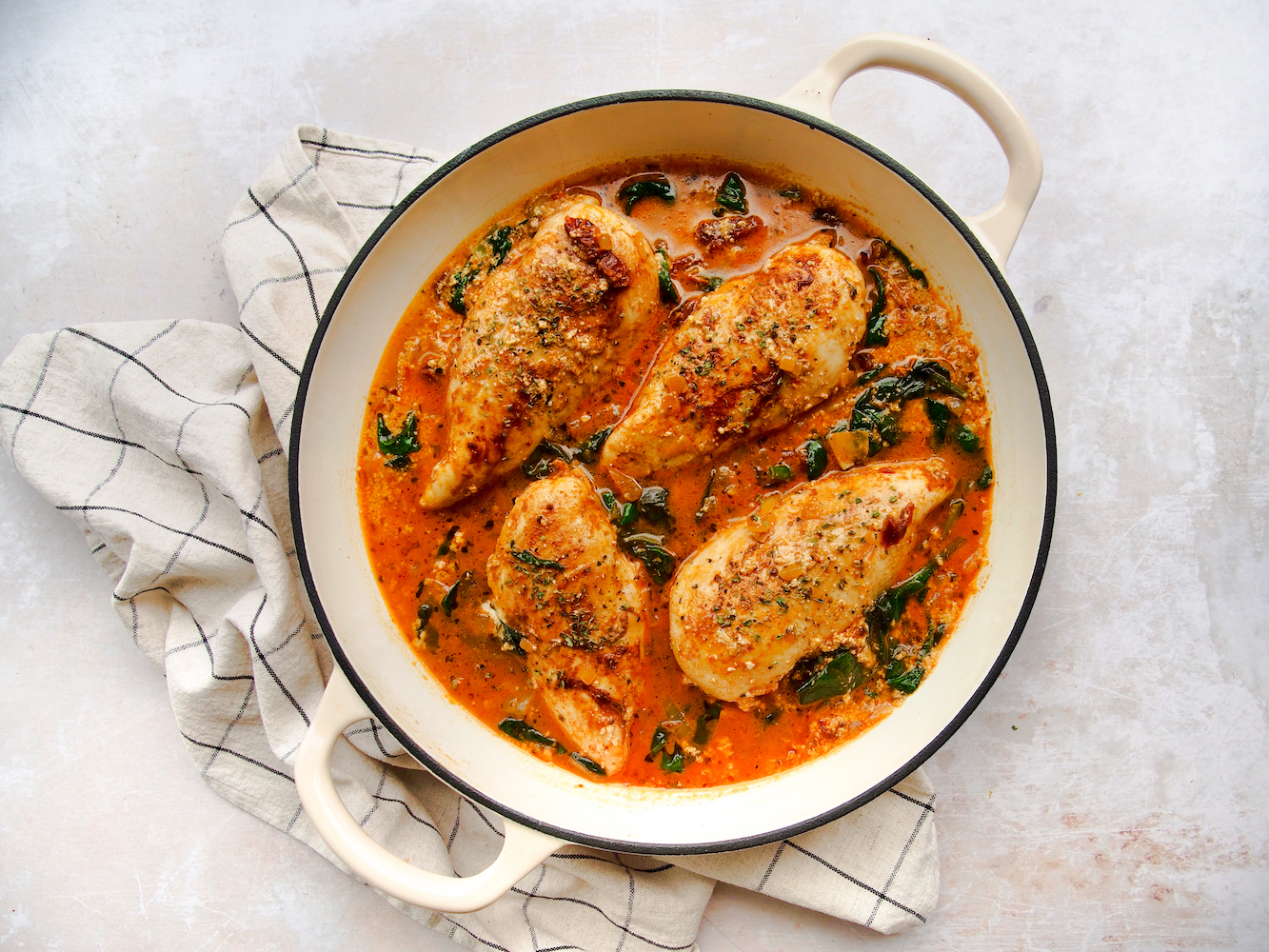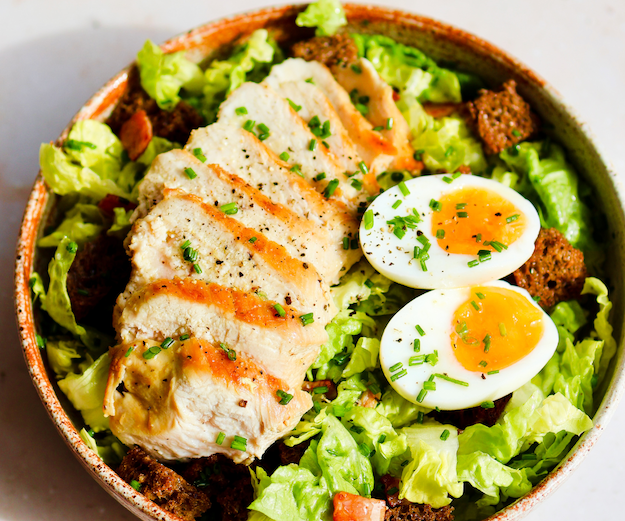Looking for more meal inspo and healthy eating tips?
Check out over 850+ recipes in the app today!
Feeling the pinch with your grocery shopping at the moment? You’re not alone. With the cost of living getting tough and prices skyrocketing everywhere, we spoke with our resident dietitian, Liv Morrison, about a topic close to our hearts and wallets: eating healthy on a budget.
Liv shares with us some insightful tips on how you can still enjoy delicious, balanced meals without breaking the bank. Check them out below:
1. Shop in season & avoid food trends
It’s best to opt for seasonal fruit and veggies on your grocery shop! These are generally a lot cheaper, stay fresh for longer, helping reduce food waste and have a higher nutrient content compared to out-of-season produce. It can also help to utilise canned legumes like lentils, beans and chickpeas to bulk out your saucy, slow cooked meals with plant protein. These have a long shelf life and are super budget friendly. They’re also packed with prebiotic fibres which is key in developing health beneficial good bacteria!
Steer clear of the ‘food trends’. Often these foods go up in price due to demand and there’s a perfectly healthy and cheaper alternative. Potatoes and rice are perfect examples of this… swap sweet potato to regular potato. White potato is just as healthy, is always cheaper and its plain flavour can be incorporated with so many more cuisines! ‘Trendier’ grains and rice like quinoa, brown and black rice are so much more expensive, but don’t provide any significant health benefits compared to cheaper alternatives like barley, basmati or white rice.
2. Meal plan your week
Think logically about what time of day and day of the week you have time to prepare meals and grocery shop. Often, we assume that we should do all of this on the weekend but that’s when the shops are busiest. ‘Sunday meal prep’ might not suit you and that’s okay! It might be more effective to prepare or cook dinner in the morning before work instead of at night or grocery shop and cook in bulk on days you work from home so you can have a break on nights you’re in the office. It’s important that the shopping and preparation processes make logical sense and fit into your lifestyle for successful habitual change!
Prioritise preparing the protein component of your weekly meals – this is what takes the longest to cook and provides most of the flavour! Cooking saucy proteins with vegetables you need to use up in bulk allows you to throw together a healthy, flavoursome meal in minutes and freeze extra portions for the following weeks. By swapping the bulk-cook cuisine each week you can build up your freezer over 2-3 weeks which is really cost and time efficient in the long run e.g. week 1: Mexican chilli con carne, week 2: Beef ragu, week 3: Thai green chicken curry. This also allows you to keep things interesting each week and avoid eating the same leftovers for days on end. The Kic app has hundreds of one-pot wonders that are great for meal prep in the ‘budget friendly’ section!
3. Get savvy at the butcher
Lean cuts of meat are really stinging the bank account at the moment so why not buy a cheaper cut and lean it out yourself – this takes a little more time but works just as well in reducing saturated fat content! Buy sale or cheaper cuts of red meat and cut off the fat before using in a slow cooked meal or freezing and the waste can be used in dog food with leftover veggies or composted. Whole chickens are very inexpensive compared to breasts or thighs and you get a lot more meat out of it! You can roast it as usual or boil it to poach for a leaner option and use the water as chicken stock in soups, curries, risotto, or freeze for later use.
Consequently, this nervous system switch shuts down our ‘rest and digest’ (parasympathetic) nervous system which controls things like digestion, gut motility, nutrient absorption & sleep.
The thing is, our modern environment is very different from the hunter and gatherer environment we’re genetically built for so many things we deal with day to day that are now considered ‘normal’ aspects of life (work, media consumption, finances, family, friends, etc) can increase stress hormones cause physical changes resulting in digestive issues. I can’t stress enough how important it is to manage stress for IBS.
4. Swap and switch for at-home alternatives
Avoid buying your morning smoothie and make it yourself – this is so much healthier as cafe options are often much higher in added sugars from juice or honey and low in protein which is important to stabilise energy levels, keeping you fuller for longer! Smoothie ingredients are really inexpensive and can be semi-prepped in advance if you have busy mornings; add frozen fruit, yoghurt and milk as a base then additions to suit your preferences e.g. flavoured protein powder, cucumber, mint, a frozen spinach cube, chia seeds, oats or muesli, peanut butter. We have tons of smoothie recipes on the Kic app that are balanced and delicious if you want guidance or inspiration.
5. Use the Kic app for some guidance!
If you’re someone who starts the week strong and burns out by Wednesday night, creating a shortlist of 5-10 easy, go-to meals that you can make in under 20 minutes is ideal! You can do this in the Kic app by browsing through our recipes and saving your ‘go-to’ ones to your app favourites! This can help with meal-inspo when the brain is working in slow-mo and takes the mental load off cooking healthy meals, prevents ordering takeaway helping you save those pennies! The Kic App has hundreds of dinner recipes that take less than 20 minutes that include just kitchen staples and minimal ingredients that are perfect for this e.g. Zesty Greens Pasta, Harissa Chicken Tray Bake, Satay Udon Bowl, One Pot Tuscan Chicken.
Another tip is to create a simple, go-to grocery list of staples you need each week like; eggs, milk, rice, oats, canned tomatoes and legumes, chicken, crackers, pasta, garlic, frozen fruit, feta. This gives you the flexibility to add fresh produce and proteins based on price. Then I’d recommend looking up recipes on the Kic app based on the key fresh ingredients you need to use that go with your other household staples e.g. ‘pumpkin’ – Pumpkin Pasta Bake, Chicken Pumpkin & Eggplant Curry, Thai Pumpkin & Cannellini Bean Soup.

This week Laura & Steph talk with dietitian Wendy Fedele to find out some tips and tricks on cost-effective ways to eat well.

Cooking and eating well shouldn’t break the bank. That’s why we have a selection of budget friendly recipes in the Kic app which cost less than $3 per serve, but are delicious and nourishing to support your health and active lifestyle.

Level up your work lunch game with these budget friendly, delicious meal ideas.
